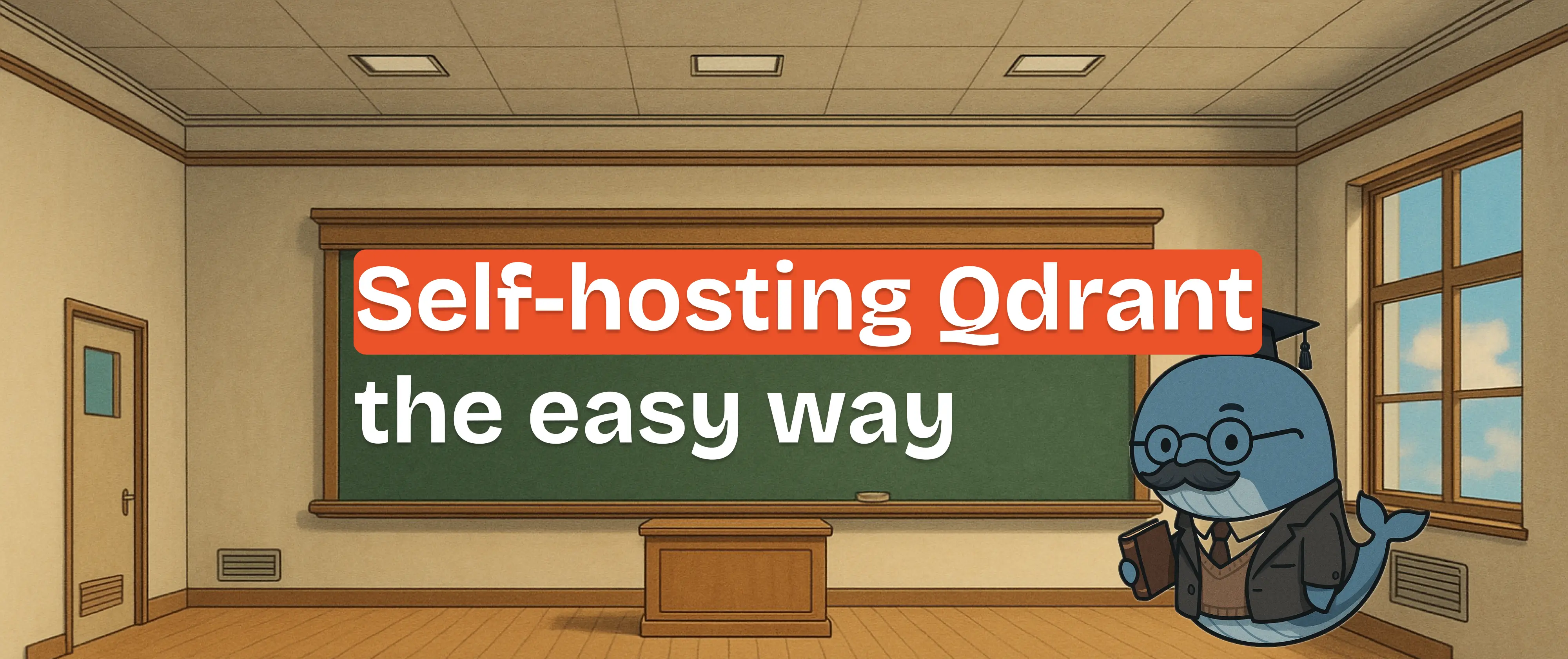
Self-hosting Qdrant the easy way
 Jonas Scholz
Jonas ScholzQdrant is one of the most popular open-source vector databases for AI and semantic search applications. Whether you're building RAG applications, recommendation systems, or semantic search engines, Qdrant provides high-performance vector similarity search with advanced filtering capabilities.
While the official Qdrant Cloud offering is convenient, it can get expensive fast, especially for production workloads. The good news? You can self-host Qdrant and get the same powerful features! In this tutorial, we'll show you how to deploy your own Qdrant instance on Sliplane for only €9 per month with virtually no limitations and full control over your data.
Why Self-Host Qdrant?
- Cost Savings: Save 70%+ compared to managed solutions
- Data Privacy: Keep your vectors and metadata on your own infrastructure
- Full Control: Configure Qdrant exactly how you need it
- No Vendor Lock-in: Migrate your data anytime without restrictions
- Scalability: Easily upgrade your server as your needs grow
If you prefer watching a video, here is a 45 second guide on how to deploy Qdrant:
Step-by-Step Deployment Guide
1. Create Your Sliplane Account
Sign up at sliplane.io for free. You can use your GitHub account for quick registration. New users get a 48-hour trial server to test everything out!
2. Set Up Your Server
If you just signed up, you'll have a trial server ready to use. Otherwise:
- Navigate to Servers in your dashboard
- Click Create Server
- Choose the "Base" instance (2 vCPU, 2GB RAM) which is perfect for most Qdrant workloads
3. Deploy Qdrant Service
- Go to your project (create a new one or use the default)
- Click Deploy Service (top right corner)
- Select the Qdrant preset from the available options
4. Configure Security Settings
⚠️ Critical Step: Before deploying, you'll see a random API key automatically generated in the environment variables. Save this API key immediately as you'll need it to authenticate all requests to your Qdrant instance!
5. Launch and Access
- Click Deploy and wait for the service to start (usually takes 1-2 minutes)
- Once running, your Qdrant instance will be available at:
your-service-name.sliplane.app - The web UI will be accessible at:
https://your-service-name.sliplane.app/dashboard
6. Test Your Connection
You can quickly test your Qdrant instance using curl:
curl -X GET 'https://your-service-name.sliplane.app/collections' \
-H 'api-key: YOUR_SAVED_API_KEY'
You should get an empty collections response, confirming your instance is working!
Cost Comparison: Why Sliplane Wins
Here's how Sliplane compares to other hosting options for running Qdrant:
| Provider | vCPU | RAM | Storage | Monthly Cost | Setup Complexity |
|---|---|---|---|---|---|
| Qdrant Cloud | 2 | 2 GB | 40 GB | $29–$49 | ⭐ Easy |
| AWS ECS | 2 | 2 GB | 40 GB | $40–$60 | ⭐⭐⭐ Complex |
| Render.com | 1 | 2 GB | 40 GB | $35–$45 | ⭐⭐ Medium |
| Fly.io | 2 | 2 GB | 40 GB | $20–$25 | ⭐⭐ Medium |
| Railway | 2 | 2 GB | 40 GB | $15–$66* | ⭐⭐ Medium |
| Sliplane | 2 | 2 GB | 40 GB | €9 | ⭐ Easy |
*Railway charges based on actual usage. $66 is maximum possible cost.
Why Choose Sliplane?
- Predictable Costs: Flat €9/month with no usage surprises
- Simple Setup: Deploy Qdrant in under 5 minutes
- European Hosting: GDPR-compliant with excellent latency
- Included SSL: HTTPS certificates automatically managed
- No Hidden Fees: 2TB bandwidth included, transparent pricing
Frequently Asked Questions
Is self-hosted Qdrant the same as Qdrant Cloud?
Self-hosted Qdrant gives you all the core features of the open-source version, including:
- High-performance vector search
- Advanced filtering and hybrid search
- Clustering and replication
- REST and gRPC APIs
- Web dashboard
Qdrant Cloud offers additional managed features like auto-scaling. For most use cases, self-hosting provides everything you need at a fraction of the cost. Check the official Qdrant documentation for feature comparisons.
What are the bandwidth costs on Sliplane?
Compute costs are always flat and predictable with no surprises! You get:
- 2TB bandwidth included in your €9/month plan
- €2/TB for additional bandwidth (€14.8/TB in Singapore)
- No charges for CPU usage or memory consumption
How do I update my Qdrant version?
Updating is simple:
- If using the
latesttag: Click Redeploy in your Sliplane dashboard - For specific versions: Update the image tag in service settings and redeploy
- Your data persists across updates thanks to volume mounting
Can I migrate from Qdrant Cloud to self-hosted?
Yes! Qdrant provides built-in backup and restore functionality:
- Export your collections using Qdrant's snapshot API
- Deploy your self-hosted instance on Sliplane
- Import your data using the restore API
- Update your application endpoints
What if I need more resources?
Sliplane makes scaling easy:
- Vertical scaling: Upgrade to larger instances (Medium: €24, Large: €44)
- Horizontal scaling: Deploy multiple Qdrant nodes with clustering
- Storage expansion: Add persistent volumes as needed
Is my data secure?
Absolutely:
- API key authentication protects your instance
- HTTPS encryption for all traffic
- European data centers with GDPR compliance
- Private networking between your services
- Automated Backups once per day
Next Steps
Ready to deploy your own Qdrant instance? Sign up for Sliplane and have your vector database running in minutes!
Need help with your deployment? Use our support chat (bottom right corner) or check out our documentation for more guides and tutorials.